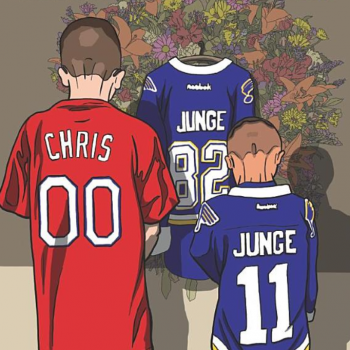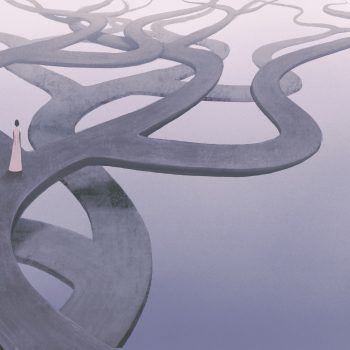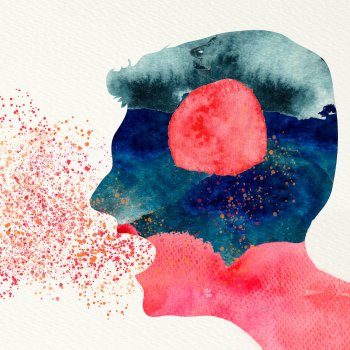The Many Types of Love and Loss
/ Emotion : Litsa
"Grief is love"
"Grief is love with no place to go"
"What is grief, if not love persevering?"
"Grief is the price we pay for love"
There are probably a hundred more grief-intertwined-with-love quotes floating around the internet. They're all lovely enough, right? I don't hate any of them. And it isn't that I disagree. But I do feel a bit unsettled. It feels like each is trying to answer a very big question:
What is grief?
And if that's the question, these answers, well, the seem to fall short. Sure, grief is love. But sometimes grief is not love. Sometimes it is the absence of love. Sometimes it is the love we craved from a parent that never came. Sometimes it is the love we put into another person and never received in return.
Love sounds so singular. And yet nothing about love (nor grief) feels singular. They both feel expansive, layered, and complex. These statements sometimes start to feel trite, like they are just another platitude meant to romanticise grief.
When I'm feeling the most jaded about these "grief is love" sentiments and in need of reassurance, I find myself most persuaded not by the words of a great poet or philosopher, but rather by the words Eleanor wrote right here at What's Your Grief:
"Perhaps the most painful kind of love is called grief, which happens when the object of a person’s love is taken away with no hope for return.
Grief is love and the confusion caused by not knowing how to love someone who is gone.
Grief is love’s frustration, bitterness, anger, and resentment at death’s destruction.
Grief is love realizing, if it wants to thrive, it has to be creative and find new ways to connect and be fulfilled.
Grief is love’s unwillingness to give up. It’s stretching bonds and redefining limits in order to create a space where you can love someone in their eternal absence"
Suddenly I read that and I think okay, maybe I'm back on board. That sounds right, that sounds complex. And if the answer to the question "what is grief" is "grief is love" then maybe the important question, is what is love?
Love.
If grief is love, I want love to be . . . more. The most. I want the word love to capture everything. And perhaps it does - maybe I am selling it short. If I am able to love nachos, love the mountains, love my mother, my partner, and my best friend, maybe love is less singular than it sounds on the surface.
Maybe love is really one word the encompasses lots of types of love?
Or maybe the word love is sometimes just a stand-in for 'like a lot'. Because though I do love nachos and my best friend, that feels like a difference in not just degree, but in kind.
So let's stick with my mother, my partner, and my best friend. Though the love I feel for each of them is different, it feels reasonable that it is all still love. I do have an intense feeling of deep affection for all of them, which the dictionary tells me is "love". Even by a slightly more specific, popular definition - love is a particularly deep type of care and concern for another person that we can't classify as another emotion - it still qualifies.
And yet I'm still left wanting something more.
Love and the Ancient Greeks
Perhaps this is where the limitation of language causes us problems.
In Greek philosophy and literature, there are several different words that are translated as "love" in English, each with its own unique connotations and interpretations. It feels hard to reflect on love without considering these types of love. Some of the most famous are:
Eros
This is the love of desire, sexual passion, and lust. Eros is associated with intense physical attraction (it's the route of the word 'erotic', which you can tuck away for trivia night). Plato wrote about eros extensively, thinking of it as something both divine but also egocentric. Though alone it could be the basis of a romantic relationship, he viewed it as an important piece of complex, loving relations when coupled with some of the other types of love.
Philia
This is the love of friendship. It is rooted in deep affection, loyalty, care, respect, and trust. Though often associated with just platonic friendships, philia isn't limited to non-sexual and non-romantic relationships. The ancient Greeks thought of it as a component of romantic love between couples as well. Plato thought that eros (which he viewed as divinely given) coupled with philia, creating what he saw as the highest form of philia love relationship.
Pragma
This is a mature love, one that is often tied to duty, reason, and shared goals. Though long-standing romantic relationships are what often first come to mind, pragma is not limited to romantic partnerships, Pragma is essential within families and very close friendships. It involves deep understanding and acceptance of the other person, with their flaws and imperfections. It is a deep commitment and devotion.
Ludus
This is a carefree, immature, and playful love. It is at the other end of the spectrum from pragma. It is a love that is early and flirty. It may develop into some of the other more mature kinds of love.
Storge
This is devoted family love. It is sometimes described as the natural and instinctual love that exists between family members, like a parent and a child. It encompasses the familiarity and comfort of family along with a sense of duty. This type of love can be one-sided, with one person feeling a greater sense of care or duty than the other.
Agape
This universal or unconditional love. It is the love that roots altruism and selflessness. It is the love that underpins a healthy society, as it describes care and concern we have for others, even if they are not directly connected to us.
Philautia
This is self-love. Importantly, they distinguish that this is not vanity or ego. Rather, it is something closer to self-esteem and self-acceptance. It is the love that means extending the same care and compassion to ourselves that we would do someone else.
So Is Grief Love?
With the incredible nuance of the ancient Greek words for love, I get closer to finding the statement 'grief is love' a little bit more complete. Because all these loves, they are enormous. They define us. And when we grieve, it isn't just that our love for the person has no where to go, but these other loves are impacted.
Our agape can suddenly erode when the world feels unfair or unjust, when we start feeling resentful or friends and strangers. Our philautia takes a hit because sometimes the person we lost was who helped us create and build our self-love, learning to see and appreciate ourselves through their eyes, their love, and their support. We can worry and wonder if it will exist without them.
Even with all these words for love, there is still one more I find myself reaching for. I want a word for a love I've written about before -- the love you only find in loss. It is the love for a person that we just couldn't possibly have known or understood while they were still here. It is only through their absence that we find out just how deep and strong it is.
Where Does That Leave Us?
I'm not exactly sure, I've got to be honest. I think I just needed some space to type this out and think it through. And maybe I've just come full circle. Grief is love AND it is more than love. Because love is more than love - it is more than our single, four-letter word can contain. And grief, sometimes, is less than love. Sometimes it is the absence of love. Sometimes it is love preserving, love with no place to go. Sometimes all we can do is remember and reflect - honor the love we had, hold on to the love we still have, and mourn the love we never received, and grieve the love that has disappeared.
Need somewhere to muse and ramble and reflect on love? We'd LOVE for you to leave a comment (or at least we'd really like it!).
We wrote a book!
After writing online articles for What’s Your Grief
for over a decade, we finally wrote a tangible,
real-life book!
What’s Your Grief? Lists to Help you Through Any Loss is for people experiencing any type of loss. This book discusses some of the most common grief experiences and breaks down psychological concepts to help you understand your thoughts and emotions. It also shares useful coping tools, and helps the reader reflect on their unique relationship with grief and loss.
You can find What’s Your Grief? Lists to Help you Through Any Loss wherever you buy books:





David Kohn March 6, 2023 at 10:45 am
Thank you for sharing your “wrestling” with the idea of loss and the vast landscape of love. I wrestle with these two truth-principles.
I’ve experienced so much loss in my life, and I would equate that all-encompassing love. Broad love and loss, for me, hurts. It’s a never-ending journey. Sometimes I feel like my back is not just against a wall, but that I experience times where I’m being pushed through the wall. I have obviously never died from this ongoing heartbreak cycle, but it has created a view of how precious life is to me.
I’m really trying to incorporate self-compassion, because personally and professionally I am walking with other grievers/bereaved people. I am so grateful that you’re “walking with me” in my journey.
Cheryl Korth February 17, 2023 at 7:16 pm
This is a wonderful article. Actually another wonderful article.
I can’t define love, but ” I know it when I see it”.
It’s having your spouse answer, “No, no way, ” when I ask him if I look fat in this skirt.
Grief is having no one to ask or give me an answer.
Love makes me happy and smile.
Grief makes me sad and cry.
It’s been 2 years since my husband passed. I have cried when I was happy and laughed when I was sad, but it’s rare very rare. Pragma.
Maureen February 17, 2023 at 6:14 pm
I lost my best friend, my husband my soulmate 6 months ago to cancer,my heart is broken we had a incredibly deep connection I was his carer for 12 months , it was so traumatising to see him wasting away every day ,we were married for 47 wonderful years I’m lost without him I’m grateful that we did have 47 years together and 2 beautiful children adults now they are my support ,friends have dropped off they don’t know what to say to me, I understand that if you haven’t been through this painful journey they don’t understand how big the loss is ,I’m trying to work through my grief but it’s so hard ,the grief comes in waves I’m just going with it hoping to heal in time .
Michelle February 17, 2023 at 10:25 am
Grief and Love are, I think, different things to different people. We all try to define them for ourselves and I don’t think any definition is wrong. It just might not be right for someone else. Just like religious beliefs, we all have our own truth.
Still, I appreciate this post. A lot of it makes sense and rings true to me. My husband died in October, 2022, just a week shy of his 50th birthday and 2 weeks shy of our 19th wedding anniversary. February 15 has always been special because it’s the date we met in person for the first time.
Thank you for this website and thank you to everyone here because it’s strangely easier knowing I’m not alone in this awful grief. My love to you all.
Karen February 17, 2023 at 4:40 am
Thank you for this latest article, I always enjoy reading your words, you explain grief so well.
For me LOVE is all consuming, enduring, covering all corners of my life. I lost my husband of 49 years; 2 years, 3 months and 8 days ago, yes I have wonderful memories but that blanket of protection has gone , that reassurance and support, the one person who always understood. I realise more than ever how wonderful LOVE is and how lucky I was to have experienced it; how much I miss his love and how much of my life he owned.
Grief is so painful but it does make us reflect and appreciate the qualities that made up the person we LOVE so much, an emotion that makes us realise we’re alive.♥️
Elswick.katherine@gmail.com February 14, 2023 at 11:35 am
I appreciate this article very much. Especially that we come to know someone after their deaths in ways we could not during our lives. Others’ stories about them, that are only shared in grief, and that sometimes illuminate moments in a shared life that were never quite understood. I was moved after my husband died that several people said, ” I never knew how much I loved him.” This is a remarkable piece. Thank you.
Christina February 14, 2023 at 10:25 am
I really needed to read this today. Thank you for taking the time to write it and share it. I am missing my husband terribly. It will be 3 years without him in June. He proposed to me on Valentine’s Day. We were together since we were 14 and I am now 34. Grief is the hardest thing I have ever had to endure. We have 4 children together. I am giving my love to them today. Agape❤️
Rachel February 14, 2023 at 9:50 am
I love this article 🙂 grief is so difficult because it touches all parts of our lives, as you lay out above. Happy Valentine’s Day!
JP February 14, 2023 at 9:08 am
I don’t think grief is love. Love is love. I still love my husband. Grief is knowing he will never be in my future plans that he is no longer in my recent history. And the longer I live the more history I will have without him. Grief is missing him and his humor on current circumstances. Not being able to touch and hug him. Grief is missing the physical and mental aspect of his person. I still love him…I just no longer have new reasons to love him, and I never will, that is grief.